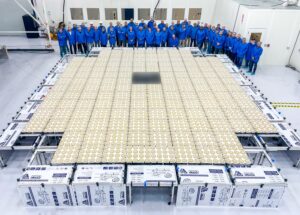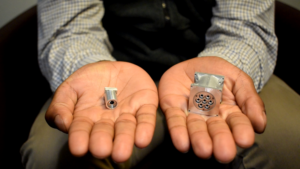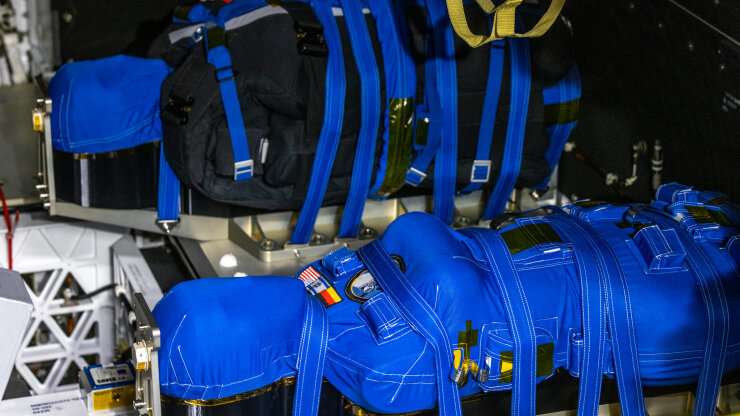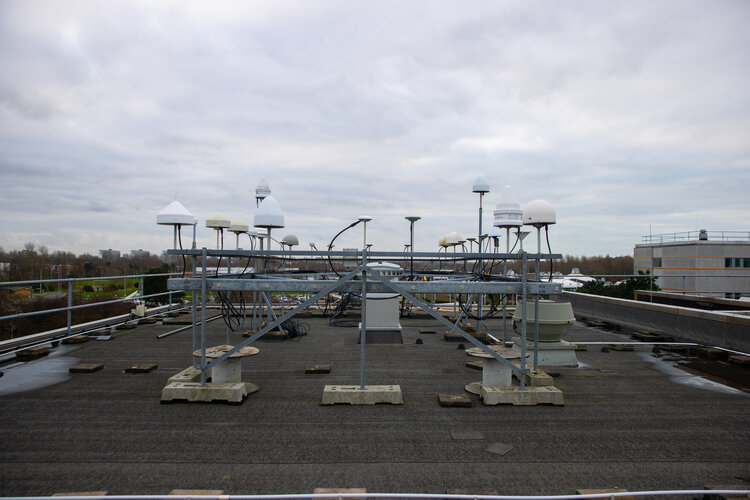Microsoft continues expanding Azure Space
Wednesday, 14 September 2022 14:13
Microsoft is continuing to expand its role in the space sector on multiple fronts with a strategy built around partnerships.
The post Microsoft continues expanding Azure Space appeared first on SpaceNews.
Taking the dazzle out of CryoSat yields a first
Wednesday, 14 September 2022 14:00
Since it was launched more than 12 years ago, ESA’s CryoSat ice mission has dazzled by way of its sheer technological and scientific excellence. This superb Earth Explorer satellite has returned a wealth of information that has transformed our understanding of Earth’s ice and how it is responding to climate change. In some circumstances, however, being dazzled isn’t a good thing, particularly when it comes to measuring the height of sea ice from space during the summer.
A paper published in Nature describes how scientists have now found an ingenious way of removing
Bandwidth-hungry regional satellite operators hunting for options
Wednesday, 14 September 2022 13:17
Regional satellite operators are searching for faster ways to add more capacity to their networks to meet soaring demand for broadband, according to executives speaking at World Satellite Business Week here.
AST SpaceMobile secures communications with prototype
Wednesday, 14 September 2022 12:51
Direct-to-cell startup AST SpaceMobile is preparing to unfurl the largest commercial antenna ever deployed in low Earth orbit after establishing contact with its BlueWalker 3 prototype satellite.
The post AST SpaceMobile secures communications with prototype appeared first on SpaceNews.
Japan, Germany declare moratorium on anti-satellite missile tests
Wednesday, 14 September 2022 12:09
Japan and Germany pledged this week not to conduct direct-ascent anti-satellite (ASAT) missile testing, throwing their weight behind the U.S.-driven initiative launched in April to promote peaceful and safe use of outer space.
Morpheus Space raises $28 million in Series A round
Wednesday, 14 September 2022 12:00
Morpheus Space raised $28 million in a Series A funding round announced Sept. 14.
The post Morpheus Space raises $28 million in Series A round appeared first on SpaceNews.
Dwarf planet diamonds could hold the key to stronger machine parts
Wednesday, 14 September 2022 11:39 Strange diamonds from an ancient dwarf planet in our solar system could lead to the production of ultra-hard machine parts, according to scientists.
A team of researchers, including those from Australia's national science agency, CSIRO, has confirmed the existence of lonsdaleite in ureilite meteorites from the dwarf planet's mantle.
Lonsdaleite is a rare, hexagonal-shaped diamond bel
Strange diamonds from an ancient dwarf planet in our solar system could lead to the production of ultra-hard machine parts, according to scientists.
A team of researchers, including those from Australia's national science agency, CSIRO, has confirmed the existence of lonsdaleite in ureilite meteorites from the dwarf planet's mantle.
Lonsdaleite is a rare, hexagonal-shaped diamond bel MDA Selected by Airbus OneWeb Satellites for US Government Program
Wednesday, 14 September 2022 11:39 MDA Ltd. (TSX: MDA), a leading provider of advanced technology and services to the rapidly expanding global space industry, has been selected by Airbus OneWeb Satellites, LLC (AOS) to design and build Ka-Band steerable antennas. The MDA antennas will be integrated into the portfolio of Arrow commercial small satellites manufactured by AOS.
"We are pleased to be selected by Airbus OneWeb Sa
MDA Ltd. (TSX: MDA), a leading provider of advanced technology and services to the rapidly expanding global space industry, has been selected by Airbus OneWeb Satellites, LLC (AOS) to design and build Ka-Band steerable antennas. The MDA antennas will be integrated into the portfolio of Arrow commercial small satellites manufactured by AOS.
"We are pleased to be selected by Airbus OneWeb Sa Northrop Grumman's rocket development reaches new heights
Wednesday, 14 September 2022 11:39 When you think of a rocket launch, you probably imagine a glistening white cylinder emerging from a cloud of smoke and fire making its way into outer space. But while the sight of a launch may only last a few minutes, not many see the dedication, long hours and incredible team effort that made it all possible.
"It's not the hardware or the software-it's the people on the launch vehicle tea
When you think of a rocket launch, you probably imagine a glistening white cylinder emerging from a cloud of smoke and fire making its way into outer space. But while the sight of a launch may only last a few minutes, not many see the dedication, long hours and incredible team effort that made it all possible.
"It's not the hardware or the software-it's the people on the launch vehicle tea Artemis I moon mission: Researchers collaborate to send manikins to measure radiation
Wednesday, 14 September 2022 11:36
When NASA's Artemis I mission launches later this year, its crew will include Helga and Zohar, two manikin models designed in collaboration with Duke University.
These models, called "phantoms," are made of materials that mimic human bones, soft tissue and organs, and they'll be fitted with sensors that will measure radiation exposure as they travel to the moon and back. Paul Segars and Ehsan Samei, both researchers at the Carl E. Ravin Advanced Imaging Laboratories at the Duke University School of Medicine, helped develop these phantoms using methods originally created to study how different medical procedures, tools and techniques precisely affect organs throughout the human body.
"Usually these 'phantoms' are virtual, and we use them to create avatars of patients. The goal of our work is that instead of conducting a clinical trial on human patients, you can use these avatars and run a simulated clinical trial through a computer," explains Samei, the Reed and Martha Rice Distinguished Professor of Radiology.
Galileo Second Generation technology tested in ESA labs
Wednesday, 14 September 2022 10:50
Europe’s first generation Galileo constellation is already the world’s most precise satellite navigation system – delivering metre-scale positioning to more than 3.5 billion users worldwide – but Galileo Second Generation will enable still better performance and an expanded range of services. Essential elements of the G2 system are currently being evaluated in ESA laboratories, including key algorithms to synchronise satellite timings and determine orbits as well as test versions of a satnav receiver and emergency beacon.
NASA science head to step down
Wednesday, 14 September 2022 10:48
The NASA associate administrator responsible for the agency’s science programs will resign by the end of the year after more than six years on the job.
The post NASA science head to step down appeared first on SpaceNews.
WVU and NASA plant the seed for STEM among youth in Plant the Moon Challenge
Wednesday, 14 September 2022 10:38 Students across the Mountain State will simulate growing crops on the moon and learn, via hands-on experiments, about NASA's Artemis mission, thanks to funding secured by the NASA West Virginia Space Grant Consortium housed at West Virginia University.
On Friday (Sept. 9), Vice President Kamala Harris, in her role as chair of the National Space Council, announced new NASA funding for sever
Students across the Mountain State will simulate growing crops on the moon and learn, via hands-on experiments, about NASA's Artemis mission, thanks to funding secured by the NASA West Virginia Space Grant Consortium housed at West Virginia University.
On Friday (Sept. 9), Vice President Kamala Harris, in her role as chair of the National Space Council, announced new NASA funding for sever Searching for Frost at Jezero Crater
Wednesday, 14 September 2022 10:38 We've all walked outside on a cold morning and seen frost on the grass, but you might be surprised to know that frost can also form on Mars! Several missions have searched for frost including Opportunity and most recently Curiosity with its REMS and ChemCam instruments. This week, Perseverance followed in its siblings' footsteps by searching for frost at Jezero Crater using its MEDA and SuperCam
We've all walked outside on a cold morning and seen frost on the grass, but you might be surprised to know that frost can also form on Mars! Several missions have searched for frost including Opportunity and most recently Curiosity with its REMS and ChemCam instruments. This week, Perseverance followed in its siblings' footsteps by searching for frost at Jezero Crater using its MEDA and SuperCam Redwire and Sodern team up to market the Exquisite-Class Eagle Eye Star Tracker
Wednesday, 14 September 2022 10:38 Redwire Corporation (NYSE: RDW), a leader in space infrastructure for the next generation space economy, today signed a formal teaming agreement with Sodern, a world leader in star trackers and neutron systems, to produce the Eagle Eye star tracker.
The Eagle Eye star tracker will offer superior performance by leveraging the exceptional flight heritage of Sodern's highly resilient modular
Redwire Corporation (NYSE: RDW), a leader in space infrastructure for the next generation space economy, today signed a formal teaming agreement with Sodern, a world leader in star trackers and neutron systems, to produce the Eagle Eye star tracker.
The Eagle Eye star tracker will offer superior performance by leveraging the exceptional flight heritage of Sodern's highly resilient modular 
